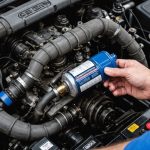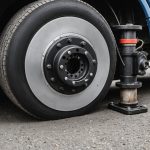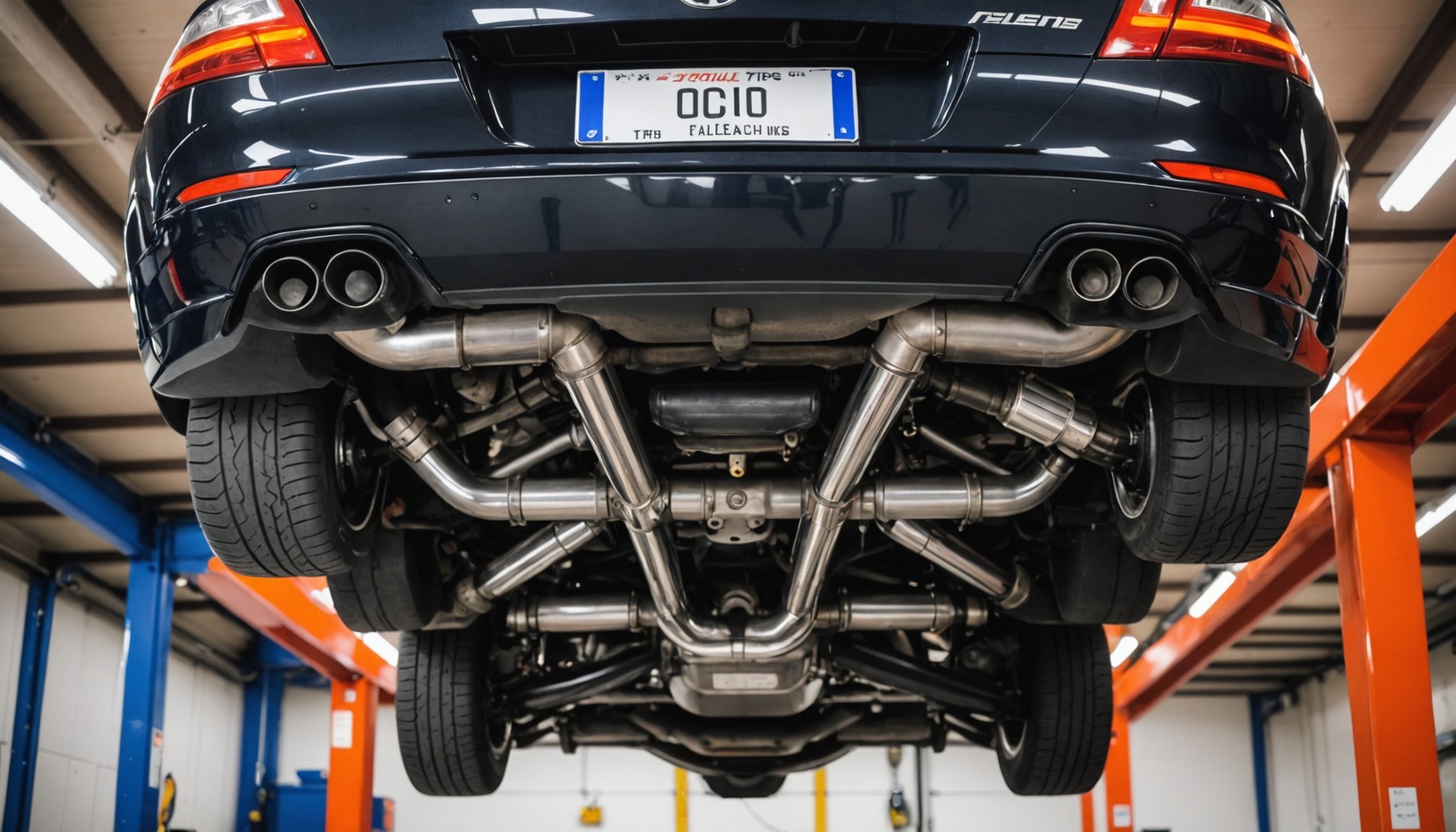Top Tips for Upholding Your British Performance Car’s Exhaust System: Best Practices for Optimal Maintenance
Understanding the Importance of Your Exhaust System
When it comes to maintaining your British performance car, the exhaust system is often overlooked, yet it plays a crucial role in the overall performance, safety, and fuel efficiency of your vehicle. The exhaust system is responsible for directing gases away from the engine and reducing noise, but it also affects your car’s power output and emissions.
“An efficient exhaust system is key to unlocking the full potential of your engine,” notes a specialist from RP Tuning, a company that has been specializing in exhaust systems for racing cars and motorcycles since 1997[1].
Topic to read : Essential Guide to Maintaining Hydraulic Brakes in British Commercial Lorries: Tips for Optimal Performance and Longevity
Here are some reasons why regular maintenance of your exhaust system is vital:
- Performance: A well-maintained exhaust system ensures that your engine can breathe properly, which translates to better performance and acceleration.
- Safety: Leaks in the exhaust system can lead to carbon monoxide entering the cabin, posing a significant risk to the occupants.
- Fuel Efficiency: An efficient exhaust system helps in optimizing fuel consumption, which is beneficial for both your wallet and the environment.
- Legal Compliance: Ensuring your exhaust system is in good condition is essential for passing the MOT test, a mandatory annual inspection for vehicles in the UK.
Regular Maintenance: The Backbone of a Healthy Exhaust System
Regular maintenance is the cornerstone of keeping your exhaust system in top shape. Here are some tips to ensure your car’s exhaust system remains running smoothly:
This might interest you : Step-by-Step Guide: Installing an Aftermarket Suspension Lift Kit on Your British Off-Road Vehicle
Oil Changes and Engine Health
Regular oil changes are crucial for your engine’s health, which in turn affects the exhaust system. Engine oil lubricates the engine’s components, including those that interact with the exhaust system.
“Regular oil changes help in reducing wear and tear on engine components, which can indirectly affect the exhaust system’s performance,” advises Matt from Euromotion, a European auto repair shop in Raleigh, NC[2].
Check for Leaks
Leaks in the exhaust system can lead to a decrease in performance and an increase in emissions. Here’s how you can check for leaks:
- Visual Inspection: Look for any signs of rust, holes, or loose connections.
- Sound Test: Listen for any unusual sounds coming from the exhaust system.
- Smell Test: If you smell exhaust fumes inside the car, it could indicate a leak.
Exhaust Wrap and Heat Management
Using an exhaust wrap can help in managing heat and reducing the risk of damage to surrounding components.
“An exhaust wrap can help in retaining heat within the exhaust system, which can improve performance by reducing backpressure,” explains a specialist from Ad-RacingWorld, a shop specializing in custom Valvetronic exhaust systems[3].
Detailed Checklist for Exhaust System Maintenance
Here is a detailed checklist to help you maintain your exhaust system:
-
Monthly Check:
-
Inspect the exhaust system for any signs of rust or damage.
-
Check for loose connections or bolts.
-
Ensure the exhaust system is properly secured to the vehicle.
-
Every 6 Months:
-
Inspect the catalytic converter for any blockages or damage.
-
Check the oxygen sensor for proper functioning.
-
Ensure the diesel particulate filter (DPF) is clean and functioning correctly if your vehicle is diesel-powered.
-
Every 12 Months:
-
Have a professional mechanic inspect the entire exhaust system.
-
Replace any worn-out components such as gaskets or seals.
-
Perform a thorough cleaning of the exhaust system.
Table: Comparison of Exhaust System Materials and Their Benefits
| Material | Benefits | Drawbacks |
|---|---|---|
| Stainless Steel | Highly resistant to rust and corrosion, durable | More expensive than other materials |
| Titanium | Lightweight, high strength-to-weight ratio, excellent heat resistance | Very expensive, difficult to fabricate |
| Carbon Fiber | Lightweight, high strength, excellent heat resistance | Expensive, prone to damage from road debris |
| Mild Steel | Affordable, easy to fabricate | Prone to rust and corrosion, less durable |
Repairs and Replacements: When and How
While regular maintenance can extend the life of your exhaust system, there will come a time when repairs or replacements are necessary.
Identifying Issues
Here are some common issues that may indicate your exhaust system needs attention:
- Loud Noises: If your car is making unusual noises, such as rattling, hissing, or roaring sounds, it could indicate a problem with the exhaust system.
- Decreased Performance: If your car is not performing as well as it used to, it could be due to a clogged or damaged exhaust system.
- Warning Lights: If the check engine light or other warning lights come on, it could indicate an issue with the exhaust system.
DIY vs Professional Repairs
While some minor repairs can be done DIY, it is often best to leave major repairs to professional mechanics.
“Professional mechanics have the expertise and tools to diagnose and repair complex issues with the exhaust system,” advises a technician from Euromotion[2].
Fuel Efficiency and Your Exhaust System
A well-maintained exhaust system can significantly impact your car’s fuel efficiency. Here are some tips to ensure your exhaust system is optimized for better fuel efficiency:
- Ensure Proper Engine Tuning: A well-tuned engine will produce fewer emissions and run more efficiently.
- Use the Right Fuel: Using the recommended type of fuel for your vehicle can help in optimizing engine performance and reducing emissions.
- Regular MOT Tests: Ensuring your vehicle passes the MOT test annually helps in identifying any issues with the exhaust system that could affect fuel efficiency.
Safety First: The Role of the Exhaust System in Vehicle Safety
The exhaust system plays a critical role in ensuring the safety of your vehicle. Here are some safety considerations:
- Carbon Monoxide: Ensure there are no leaks in the exhaust system to prevent carbon monoxide from entering the cabin.
- Brake Pads: While not directly related to the exhaust system, ensuring your brake pads are in good condition is crucial for overall vehicle safety.
- Wiper Blades: Clear visibility is essential for safe driving; make sure your wiper blades are in good condition.: The Long-Term Benefits of Proper Exhaust System Maintenance
Maintaining your British performance car’s exhaust system is not just about ensuring it runs smoothly; it’s also about safety, performance, and fuel efficiency. By following the tips outlined above, you can ensure your vehicle remains in top condition for years to come.
“Regular maintenance is key to extending the life of your exhaust system and ensuring your car performs at its best,” concludes a specialist from RP Tuning[1].
By investing time and effort into maintaining your exhaust system, you are not only protecting your investment but also enhancing your driving experience. Remember, a well-maintained exhaust system is a cornerstone of a healthy, high-performance vehicle.











